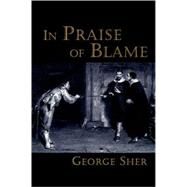In Praise of Blame
, by Sher, George- ISBN: 9780195339314 | 0195339312
- Cover: Paperback
- Copyright: 12/3/2007
Blame is an unpopular and neglected notion: it goes against the grain of a therapeutically-oriented culture and has been far less discussed by philosophers than such related notions as responsibility and punishment. This book seeks to show that neither the opposition nor the neglect is justified. The book's most important conclusion is that blame is inseparable from morality itself--that any considerations that justify us in accepting a set of moral principles must also call for the condemnation of those who violate the principles. Properly understood, blame and morality must stand or fall together. Because blame has not received much sustained attention, the book works its way toward its conclusions by first raising, and then seeking to resolve, a series of conceptual and normative questions. These questions include: How are blameworthy acts related to the characters of the agents who perform them? Can agents deserve blame for their bad traits as well as their bad acts? Is blame best understood as a kind of action, a kind of belief, a kind of feeling, a combination of these elements, or something different entirely? What sort of normative concept is blameworthiness? How do blame and blameworthiness--correlative notions--fit together? Considered as a group, the questions yield a unified and comprehensive theory of both blame and blameworthiness. In developing that theory, the book both criticizes and draws inspiration from the two most important previous treatments of its topic: Hume's discussion of the relation between character and blame and Strawson's landmark discussion of the "reactive attitudes." However, the theory that emerges is neither Humean nor Strawsonion: it is a new theory that seeks to do more justice than its predecessors to the indispensable role that blame plays in our moral lives.







